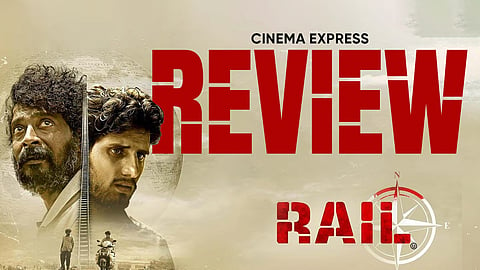Rail Movie Review: A much-needed message saves this lengthy drama
Rail(3 / 5)
Any piece of art that advocates for the need for self-introspection will touch a raw nerve. Some films profess these ideas in an amicable way, while others deal a heavy blow while attempting to point out a social evil. Debut director Bhaskar Sakthi's Rail is a bitter pill that may not satiate your taste buds, but it tries its best to provide an antidote to a particular social illness.
The film, previously titled Vadakkan, begins in Theni with a mostly sedentary—but an electrician at times—Muthiah (Kungumaraj Muthusamy). He is the least trustworthy person in his village. Give him the easiest task; he will mess it up in unimaginable ways. His character is both amusing and anathemic at the same time. Rail will not work if Muthiah's character doesn't. Being the only character with an arc, Muthiah exudes a charm atypical of Tamil cinema heroes who are hard to root for, but we end up rooting for them because they mirror some of our own vulnerabilities. Like Kadolara Kavithaigal's Chinnappadas and 7/G Rainbow Colony's Kathir, you curse Muthiah, and yet we don't want to see him crumble into pieces but reform as a person.
Bhaskar Sakthi, who is also an author, excels at making us hate Muthiah, as he attributes his personal and professional failure to his North Indian neighbour Sunil (Parvaiz Mehru), who too is in a blue-collar job but has earned a good name for himself. Another wastrel, Varadhan (Ramesh Vaidya), tags along with Muthiah, wanting to chase the 'outsiders' in their village who are, according to them, making their lives worse. They are planning to start their expunging operation with Sunil. But before they could proceed with that, they were met with an unforeseen happening that changed their lives. What the change leaves Muthiah with is what the film is all about.
Rail moves at a steady pace in the first half. The narration shifts from one scene to another with nothing startling. The intention was to create drama, provide a character study, and heighten the friction between Muthiah and Sunil, which was achieved satisfactorily. The lengthy scenes do not seem tardy, as we are shown with precision, even the minor characters and seemingly irrelevant details. There is a scene where Muthiah voices his opposition to making panipuris instead of the native vada and bonda, and a scene in which he plays with a child. The second half makes even such minor scenes count. Despite all the hostility Muthiah is turning against himself, he is also seen struggling to escape the rut. Possessing no redeeming qualities whatsoever, we still give Muthiah the benefit of the doubt, as he is written off as a good-for-nothing drunkard by his wife Chellama (Vairamala) and father-in-law Dhandapani (Senthil Kochadai). This is a smart writing choice by the director. Just like the chicken or egg paradox, we decide to assume he could have also been made a wastrel with no word or act of encouragement.
Director: Bhaskar Sakthi
Cast: Kungumaraj Muthusamy, Parvaiz Mehru, Ramesh Vaidya, Vairamala, Senthil Kochadai
The mostly new star cast has put out an engrossing performance. The rookieness of the actors has brought a lot of originality to the screen. Not a speck of artificiality could be found in a wailing old woman or an arguing husband and wife. Actor Vairamala stands out in scenes where she expresses apprehensions about bearing a child and seeking financial help from her father. Parvaiz Mehru's performance is worth laurels. The director presents Mehru's character Sunil as a voice of sanity in the scene where his colleague, also from North India, calls all Tamils rude, criticising his overbearing manager, to which Sunil replies, "Not all Tamils, all managers are rude." The director also expresses his political awareness by using another minor but important character, who calls out Muthiah for targeting harmless daily wagers when instead he should have gone for the powerful who are plundering the state's resources.
Notwithstanding, the film does get tiresome when we get way too many 'sarakku' scenes, despite the point that Muthiah is a boozehound was conveyed a long time ago. There is a brief ghost scene that doesn't elicit any fear; even if it did, it seems out of place in a film that focuses on social issues.
However, the pertinent message that Rail puts out makes us blind to all of its excesses. Coming at a time when affinity towards regional identity might be construed as animosity towards people of the other region and, on the flip side, jingoism is trying to subsume regional identities, Rail, not feeding on these populist ideas, has taken an unpopular but welcome stance.

